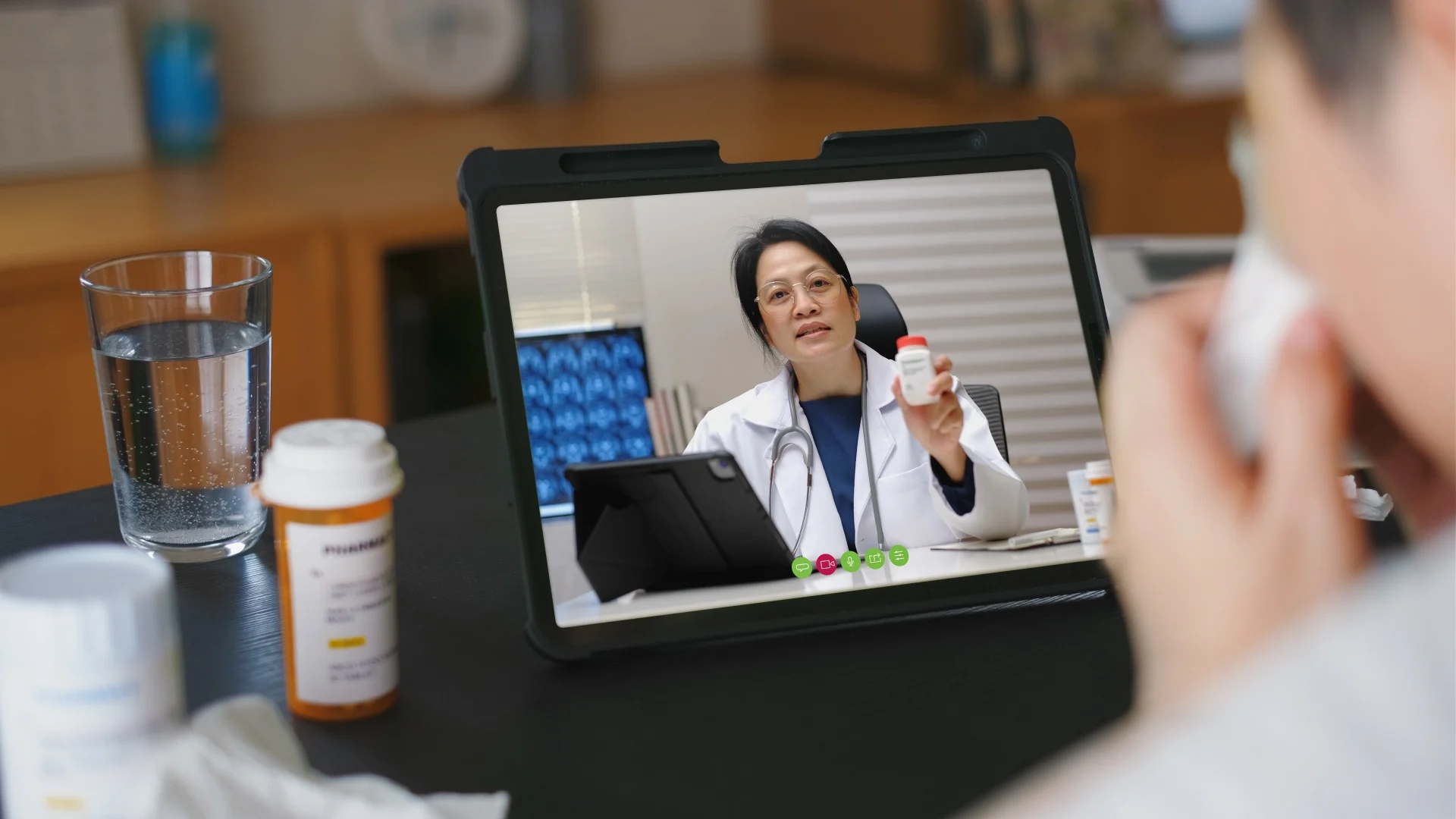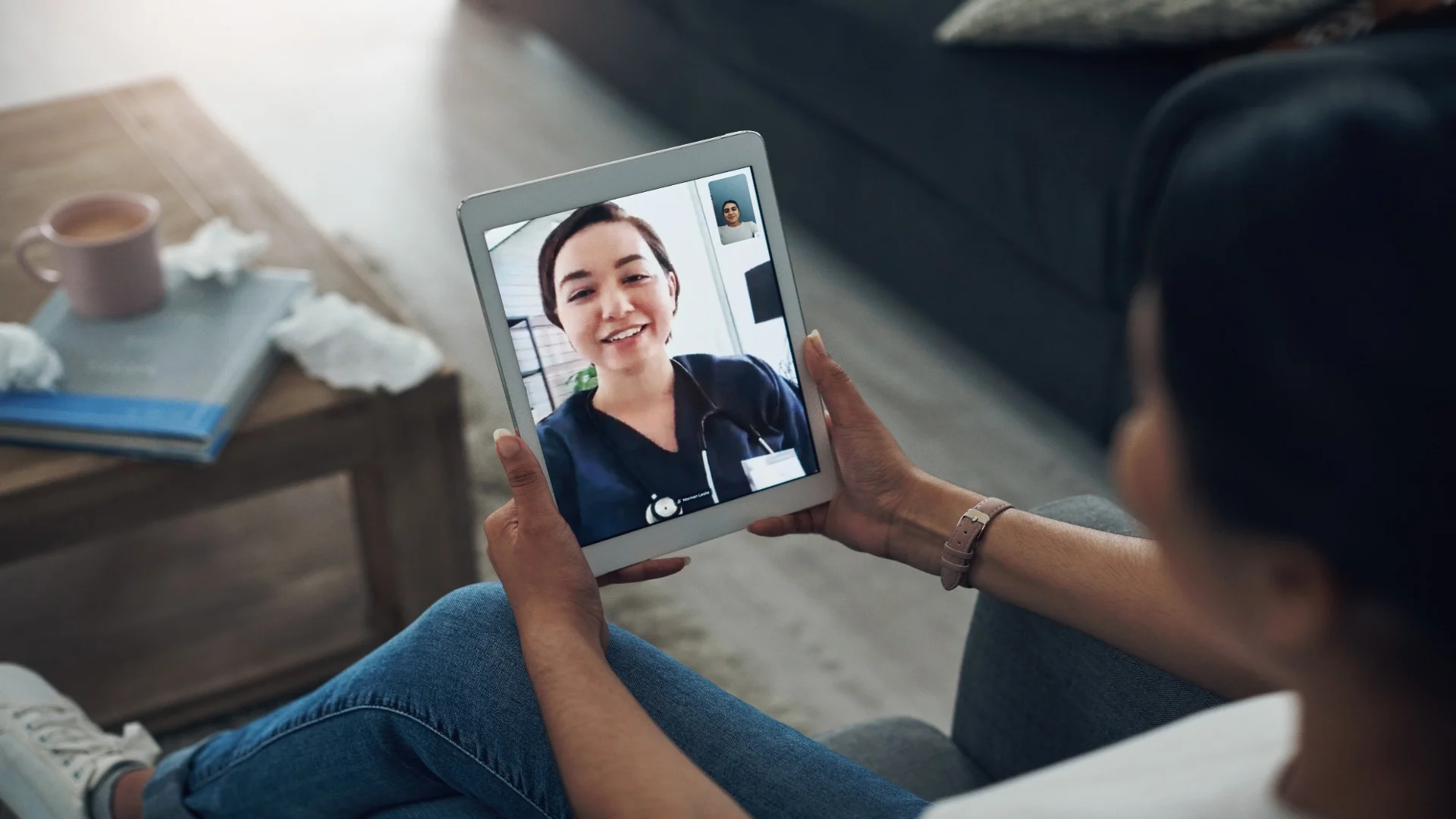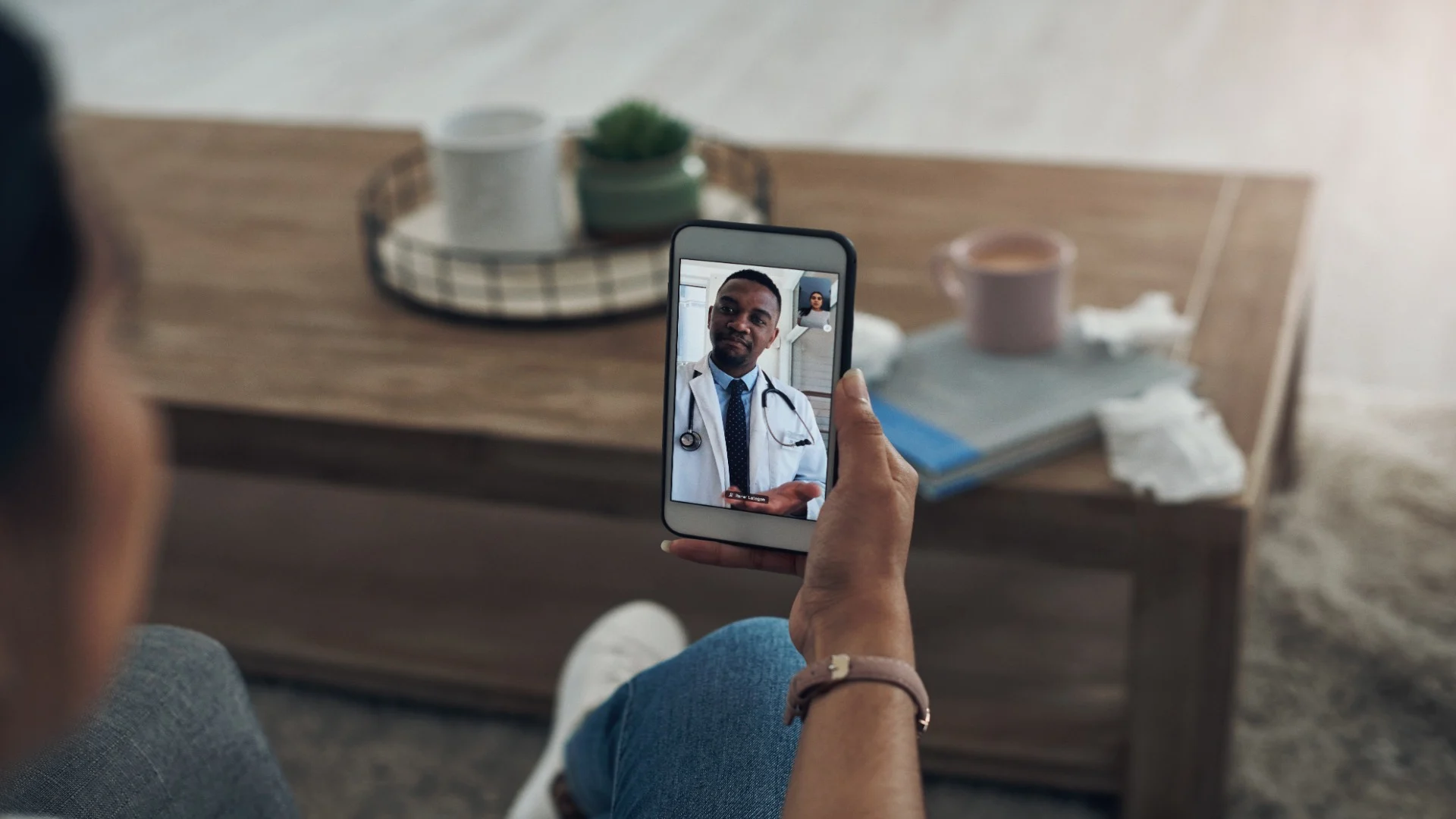Mental Health
Convenient, Confidential Support for Lasting Recovery

Discover how telehealth mental health services provide convenient, confidential, and personalized support for lasting recovery. Access therapy from anywhere with flexible, secure care.
What are the main benefits of telehealth mental health services?
Telehealth offers convenient access to care, increased privacy, and flexible scheduling. It eliminates travel time and provides support regardless of location, making it ideal for those with busy lives, mobility challenges, or limited access to in-person mental health services.
Is telehealth therapy as effective as in-person sessions?
Research shows telehealth is equally effective for many mental health conditions. A strong therapist-client connection, combined with a private environment, enables meaningful progress, making virtual sessions a viable and effective alternative to traditional therapy settings.
How is my information protected in telehealth sessions?
Telehealth sessions use encrypted, HIPAA-compliant platforms to safeguard your data. Providers adhere to strict confidentiality protocols to ensure that your personal information and therapy conversations remain secure, thereby creating a safe space for open and honest communication during treatment.
What technology do I need for telehealth?
You’ll need a smartphone, tablet, or computer with a camera and microphone, as well as a stable internet connection. Secure apps or platforms are used to connect you with your therapist in a private, distraction-free environment for practical virtual sessions.
Does insurance cover telehealth mental health care?
Many insurance plans include coverage for telehealth services, recognizing their importance in expanding access to mental health care. Coverage may vary, so it’s best to check directly with your insurance provider to confirm benefits and any specific plan requirements.
In today's fast-paced world, mental health support must be flexible, secure, and easily accessible. Telehealth mental health services meet that need, providing therapy, counseling, and crisis support from the comfort of home.
These services reduce barriers, offering privacy, convenience, and high-quality care, regardless of your location. Whether you're facing addiction, anxiety, or depression, telehealth creates a path to lasting recovery by combining professional help with digital innovation.
At The Edge Treatment Center, we enhance this powerful support system with personalized care tailored to your specific needs. Telehealth makes healing not only possible but more accessible than ever.
Revolutionized Mental Health Care
Traditional therapy models often involve barriers like long commutes, inflexible office hours, or social stigma. With telehealth, those obstacles are removed. Instead of struggling to fit therapy into your day, you can log into a secure session during a break, after work, or even from a quiet corner at home. For many, this convenience is what makes seeking help feel doable.
Telehealth also offers enhanced privacy. Some people avoid treatment due to fear of judgment or being recognized at a facility. With virtual care, therapy is discreet, allowing you to access support without drawing attention to yourself. This fosters a sense of safety and control—two vital components in the recovery process.
Beyond accessibility, telehealth promotes continuity. Life doesn’t always go as planned, but missing therapy because of illness, travel, or bad weather is no longer an issue. As long as you have an internet connection, your support system is within reach.
Understanding Telehealth Mental Health Services
Telehealth is a modern, technology-driven approach to delivering professional mental health care remotely.
Remote Therapy via Technology
Virtual therapy allows you to connect with licensed professionals through secure video or phone sessions. These real-time interactions mirror in-person visits, providing a space for open conversation, progress tracking, and emotional support.
You don’t need technical expertise—most platforms are intuitive and user-friendly. Whether you're dealing with anxiety, trauma, or addiction, telehealth tools help bridge the gap between you and consistent care.
Key Benefits at a Glance
Telehealth offers a range of benefits that directly support recovery and rehabilitation.
Convenience: Fit therapy into your schedule without the need for travel.
Privacy: Receive care discreetly from a personal space.
Accessibility: Get help wherever you are.
Cost Efficiency: Save on time, transport, and related expenses.
Consistency: Maintain regular sessions without disruptions to your life.
These features make recovery support more reliable, especially for those managing work, family, or mobility challenges.
Benefits of Telehealth Mental Health Services
Telehealth offers concrete advantages that enhance every step of the recovery process.
Unrestricted Access
Telehealth empowers you to access therapy from anywhere, including rural or underserved areas. If you're homebound due to illness, mobility issues, or personal obligations, you can still meet with a licensed professional. This expands mental health access to people who may have previously gone without.
Budget-Friendly
Without the need for travel, childcare, or time off work, therapy becomes more financially manageable. Many insurance plans now cover telehealth, reducing out-of-pocket costs. The reduced overhead of digital platforms also enables providers to operate more efficiently, resulting in more affordable pricing.
Customized to Your Needs
Whether you need early-morning sessions before work or evening support after dinner, scheduling is flexible. You can participate from a space that feels emotionally safe, reducing anxiety and enhancing openness. Providers can also adjust therapy techniques, frequency, or even switch to different modalities based on how you respond over time.

We’re Here To Help You Find Your Way
Would you like more information about telehealth? Reach out today.
How Telehealth Works: A Guide
Getting started with telehealth is simple, structured, and designed for your comfort.
Booking Your Session
The intake process is straightforward: you’ll fill out digital forms, provide insurance information, and complete a brief history questionnaire. Your provider may also guide you through accessing the session link and preparing for your first visit.
Necessary Equipment
You’ll need a smartphone, tablet, or computer with a working camera and microphone. A steady internet connection is essential to prevent lag or interruptions. Many platforms work through browsers or simple apps, so there's no complicated setup required.
Protecting Your Privacy
Reputable platforms are encrypted and HIPAA-compliant, meaning your sessions are private and secure. You’re encouraged to find a quiet, private space at home, so you feel safe and undistracted during the session. The combination of technology and environment ensures a secure, comfortable experience.
Engaging in the Session
Sessions may include open discussion, structured techniques like CBT, or check-ins for medication. You and your provider will work together to explore challenges, identify strengths, and set actionable goals. The format encourages honest communication and personalized care.
Ensuring Ongoing Support
Your therapist will suggest a schedule that supports your needs, whether weekly therapy or monthly medication reviews. Digital systems enable you to book future sessions, send messages, and access educational resources between appointments, thereby enhancing ongoing care and support.
Common Uses for Telehealth in Mental Health Care
Telehealth supports a wide range of mental health services, from assessment to crisis response.
Remote Evaluation Tools
Whether it’s anxiety, depression, PTSD, or another condition, early detection through digital screening tools helps professionals plan effective treatment. These evaluations are often integrated into your first few sessions and are as reliable as in-person assessments.
Virtual Therapy Services
This includes individual talk therapy, family counseling, and structured approaches like dialectical behavior therapy (DBT) or trauma-focused therapy. Virtual settings also support education, coping skills, and relapse prevention techniques in real time.
Medication Planning

Psychiatrists can conduct check-ins, monitor side effects, adjust dosages, and renew prescriptions—all without requiring in-office visits. This approach is especially beneficial for individuals managing anxiety, mood disorders, or co-occurring conditions alongside therapy.
Addressing Urgent Needs
Many providers offer urgent appointments or connect clients with emergency mental health services as needed. This rapid access can de-escalate situations and provide critical intervention without long wait times.

We’ll Lead You to New Heights
Do you have more questions about telehealth? Reach out.
Privacy and Confidentiality in Telehealth
Maintaining confidentiality is fundamental to building trust in remote care.
Significance of Securing Privacy
Knowing your sessions are private makes it easier to share openly.
When clients feel confident that their thoughts and struggles are kept confidential, they’re more likely to engage fully in therapy, an essential part of the healing process.
Safeguarding Confidentiality
Encryption, firewalls, secure access, and platform audits ensure your information remains protected. Providers also adhere to strict professional ethics to prevent the unauthorized sharing or misuse of patient data.
Adhering to Regulations
These regulations require secure handling of electronic health records and transparent practices around consent and communication. Compliance provides you with peace of mind, knowing that your care is both legally and ethically sound.
Challenges and Considerations
While powerful, telehealth still presents some challenges to address.
Tackling Tech Issues
To overcome this, platforms are evolving to work in low-bandwidth settings or offer alternatives, such as audio-only sessions. Still, bridging the digital divide is essential for equitable access.
Strengthening Virtual Bonding

Therapists are trained to adapt communication styles and create warmth across digital formats. Clients, too, benefit from being open about what makes them feel connected.
Understanding Regulatory Framework
Patients should confirm that their provider is licensed in their state or country. Providers must stay updated on cross-jurisdictional rules to ensure compliant and ethical service.

We’re Here To Help You Find Your Way
Do you need advice about telehealth? Reach out today.
Healing in Your Hands
Telehealth has reimagined the way we approach mental health care, making it more convenient, private, and accessible than ever.
No longer limited by time, place, or stigma, you can now engage in meaningful therapy from the safety and comfort of your home. Whether you're managing anxiety, addiction, or depression, Telehealth mental health services open the door to timely, personalized treatment.
At The Edge Treatment Center, we are dedicated to delivering expert support through this innovative platform. Ready to begin your journey to lasting recovery? Reach out today and let telehealth put the tools for healing directly in your hands—because you deserve care that meets you where you are.

We’re Here To Help You Find Your Way
If you or a loved one is struggling with addiction, there is hope. Our team can guide you on your journey to recovery. Call us today.
Written by
The Edge Treatment Center
Reviewed by
 Jeremy Arzt
Jeremy ArztChief Clinical Officer
Mental Health
July 15, 2025
